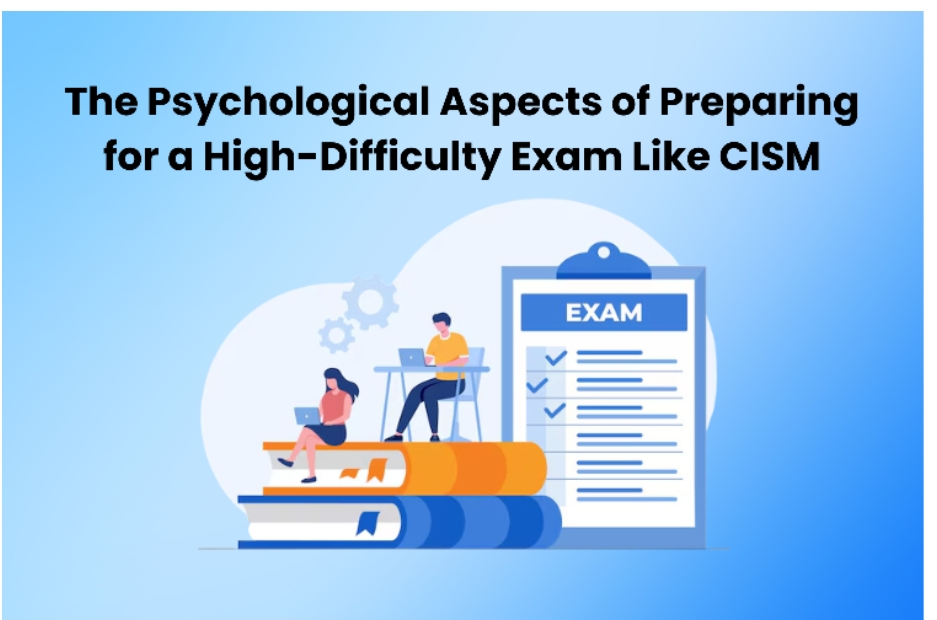Preparing for a difficult exam is not an easy feat. The CISM Certification exam is a prime example in this regard. The CISM Exam Difficulty is notoriously famous, preparing for which often pushes candidates to their mental and emotional limits. However, it can make all the difference if you understand what the psychological barriers to your preparation are and develop good coping techniques. Mastering your mind is as important as mastering the exam content.
Preparing for CISM Exam and Its Psychological Pressure
CISM exam preparation requires you to have a high level of mental toughness. Worrying about the outcome will make it harder to focus on the preparation. Meaning that worrying too much about the exam can cause anxiety, affecting your exam preparation. Realising your anxieties and dealing with it correctly helps maintain your mental health during your preparation.
Setting Realistic Goals
You have to set goals to prepare, but unrealistic goals can cause stress and lead to failure. First, you must understand your current knowledge level and capacity to learn new things. Set achievable goals that will help you prepare for the exam. This method builds your confidence as you accomplish each small goal, making the bigger goal seem more attainable.
Developing a Robust Study Plan
Your road map to success is a well-organised study plan. The exam syllabus and your learning style will come together smoothly under the correct study plan. Is your productivity higher in the morning or at night? Do you retain more information through reading or practical examples? Considering such preferences and your lifestyle while preparing your study plan can avoid the stress of cramming everything together and doing last-minute revisions.
Embracing the Power of Breaks
Do not forget the importance of taking a break. Studying too hard without taking any breaks will cause burnout. Relaxation techniques can help with your preparation. The Pomodoro Technique is an effective method requiring a 5-minute break following every 25 minutes of focused work. Such methods have been shown to improve focus and stamina. Regular breaks between study sessions will refresh your mind, making you more productive and less likely to get tired.
The Role of Mock Exams
Mock tests are a huge help while preparing for a difficult exam. They help you understand the exam’s structure and timing. They also help you identify the areas where you need improvement. Regularly practising under situations similar to the real exam can help you feel a lot less anxious on the exam day.
Seeking Support
The journey towards exam success can get lonely at times. Seeking support from friends, mentors, or study groups can give you fresh perspectives on how to prepare for the exam, boosting your confidence. You can benefit a lot from discussing complex topics or sharing study tips.
Maintaining Your Physical and Mental Health
Taking care of your mental health and cognitive abilities is crucial during exam preparation. You can achieve this by including regular exercise, a nutritious diet, and adequate sleep into your routine. Exercise helps by releasing endorphins in your body. These chemicals improve your mood and reduce feelings of depression and anxiety. A healthy diet and proper sleep can enhance brain function and memory retention.
Staying Motivated
It can be hard to stay motivated during preparation, especially when the exam seems far away. Visualisation methods, where you picture yourself succeeding, are an effective way to stay motivated. Plus, keep reminding yourself about why you wanted to pursue the CISM certification in the first place. Whether they’re for career advancement, personal growth, or professional recognition, keeping these motivations in mind can help you stay on track.
Reflecting on Your Progress
Reflecting on your accomplishments and your progress can act as a huge psychological boost. It helps in realising your growth and becomes a motivation to study when you feel stuck.
Handling Setbacks Gracefully
You will face setbacks during your CISM exam preparation. How you deal with these challenges, whether difficult topics or bad scores in mock exams, is critical. You should consider setbacks as learning and growth opportunities. You have to use your mistakes to learn and make necessary changes to your study plan. If you maintain a positive mindset and learn from setbacks to guide your plans, you can master complex topics and become more resilient, preparing you for challenges in the real world.
Conclusion
It is not an easy feast preparing for the CISM exam. But you can do it if you have the right psychological tools and strategies. You can prepare well if you understand the mental demands of preparation, set realistic goals, and keep a healthy balance between study and life. This kind of preparation process makes you more resilient and confident, helping you in life long after the exam. Remember, it’s not just about passing an exam; it’s about building a successful future for your personal and professional life.







